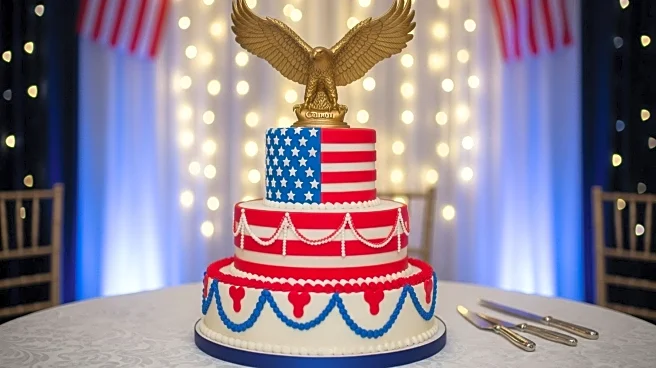What's Happening?
President Trump has proposed a grand celebration for the United States' 250th birthday in 2026, which he envisions as a nationwide event reminiscent of historical world fairs. The plan includes a traveling Great American State Fair with pavilions from all 50 states, a UFC fight at the White House, and the presentation of the largest U.S. flag in history. However, the initiative has raised concerns among state and local planners about funding and the potential for the event to become politically divisive. Critics, including John Dichtl of the American Association for State and Local History, have expressed worries that the celebration may prioritize patriotism over a comprehensive reflection on the nation's history. The Trump administration's approach contrasts with the 1976 bicentennial, where the federal government provided substantial funding for local celebrations.
Why It's Important?
The proposed celebration for America's 250th birthday is significant as it highlights the intersection of national pride and political influence. The event's planning and execution could impact public perception of national unity and historical reflection. The lack of federal funding compared to the 1976 bicentennial raises concerns about the ability of states to independently organize meaningful events. Additionally, the involvement of Trump-aligned groups and the administration's influence on the nonprofit America250.org suggest a potential shift towards a more partisan celebration. This could affect how the anniversary is perceived across different political and social groups, potentially leading to a divided national narrative.
What's Next?
As the 250th anniversary approaches, states are expected to continue planning their celebrations, balancing between national initiatives and local priorities. The Trump administration's influence on the event's direction may prompt further debate over the role of federal funding and the potential for political bias. State planners may seek alternative funding sources to maintain autonomy over their events. The administration's review of the Smithsonian Institution's content and partnerships with conservative groups could further shape the narrative of the celebrations. Stakeholders, including political leaders and civil society groups, may respond to ensure the anniversary reflects a diverse and inclusive representation of American history.
Beyond the Headlines
The planning of America's 250th birthday celebration raises broader questions about the role of historical commemoration in shaping national identity. The potential for a partisan tone in the celebrations could influence public discourse on patriotism and historical accuracy. The involvement of groups like Moms for Liberty and partnerships with conservative media may reflect ongoing cultural and educational debates. The event also highlights the challenges of balancing national pride with a critical examination of history, particularly in a politically polarized environment. The outcome of these celebrations could set a precedent for future national commemorations and their role in fostering unity or division.









